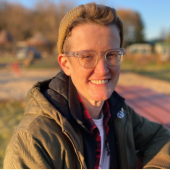Then to Now: Research Assistant Professor Ricky Hill, Ph.D.
In our Then to Now series, we speak with Institute for Sexual and Gender Minority Health and Wellbeing faculty and staff about their career trajectories and how they came to work in LGBTQ health research.

Ricky Hill, Ph.D.
“I don’t operate from a scarcity mindset -- I operate from an abundance mindset,” Ricky Hill, Ph.D., said when reflecting on their career trajectory. Hill, a research assistant professor at Northwestern University’s Institute for Sexual and Gender Minority Health and Wellbeing (ISGMH), holds a Ph.D. in Health Communication from the University of New Mexico, an M.A. in Media Studies from the University of Texas-Austin, and a B.A. in Moving Image Arts from the College of Santa Fe. Hill is also the director of the 2GETHER Project with the THRIVE Center, which is housed in ISGMH. An academic life was not necessarily what Hill imagined their future might look like.
Growing up in Oklahoma, Hill had aspirations to become a meteorologist. “I also wanted to be a cat when I grew up,” Hill said. This might have foreshadowed the fact that following their curiosity would become an important through line in their career. “It’s about curiosity,” Hill explains. “I don’t think it’s about your formal training. It’s not that I am particularly scientifically minded, it’s that I’m curious, and I’ve asked a bunch of questions that led me to this field.”
Hill became interested in media as a high school student, taking media classes available because their high school had a TV station with a cable access channel. They went to college to become a video artist, but quickly realized that the working conditions associated with the film industry were not for them. Fortunately, Hill enrolled in media theory classes that opened up new ways of thinking.
“I took a class called ‘Media and Democracy’ that was essentially a media literacy course,” Hill explained. “It was all about how the news media was basically a propaganda machine and my mind was blown by that. And I started thinking critically about media.”
Moving Into Public Health
After completing their B.A., Hill took an internship at the New Mexico Media Literacy Project. There they worked on tobacco use within LGBTQ communities.
“I had never heard about target marketing to queer communities. I never knew that tobacco and alcohol companies were the only companies willing to market to queer folks and I was incensed that the only people who wanted to spend money on my community were selling addictive products,” said Hill.
It was this work that inspired them to get into public health.
From there Hill went on to get their M.A. in media studies with the objective of developing media literacy curricula. As they pulled up their sleeves and got to work, they found themselves taking a slight detour into new media studies. Hill became interested in understanding how queer folks in non-urban areas were using online spaces to build support networks that would then trickle into spaces offline.
“I was thinking about building that community as a protective factor from things like target marketing. That’s where I veered into health communication because, at the time, I didn’t even know health communication was a field,” Hill explained.
Hill completed their doctorate in health communication at the University of New Mexico. The program was especially unique because of its intercultural focus.
“They defined culture broadly, so I could study queer culture and health communication and combine those two in a way that I wouldn’t have been able to anywhere else,” said Hill.
Current Work
In October 2020, Hill was promoted to research assistant professor at Northwestern. Hill is currently a faculty member at ISGMH, where they direct the 2GETHER Project, an HIV prevention and relationship education program for young male couples.
“At ISGMH I feel like my varied background is valued by folks on my team, and it feels really nice,” said Hill.
Hill also works with the Northwestern Medicine Gender Pathways Program, developing needs assessments and questionnaires for use within the clinic. The Gender Pathways Program is a multidisciplinary team of specialists who offer a range of surgical, medical, and mental health services committed to providing gender affirming care to transgender and gender non-binary individuals.
“Working with GPP has been great. In the past, I’ve worked with physicians who assumed that their medical degrees meant they automatically knew what was best for my communities. The team at GPP has done a great job at trying to disrupt the narrative of provider-as-expert and is really working to center the experiences of trans people in their healthcare. It sounds so simple, but you’d be surprised.”
Looking back on their trajectory, Hill appreciates the nonlinear path that led them to become a research assistant professor.
“It all makes sense now, but at so many points along my career path I thought, ‘I don’t know what my end goal is. I just know I have a question, and this is the path it’s leading me down.' To me, curiosity is the ultimate predictor of success in science. You have to be someone who asks questions and really wants to know why,” said Hill.